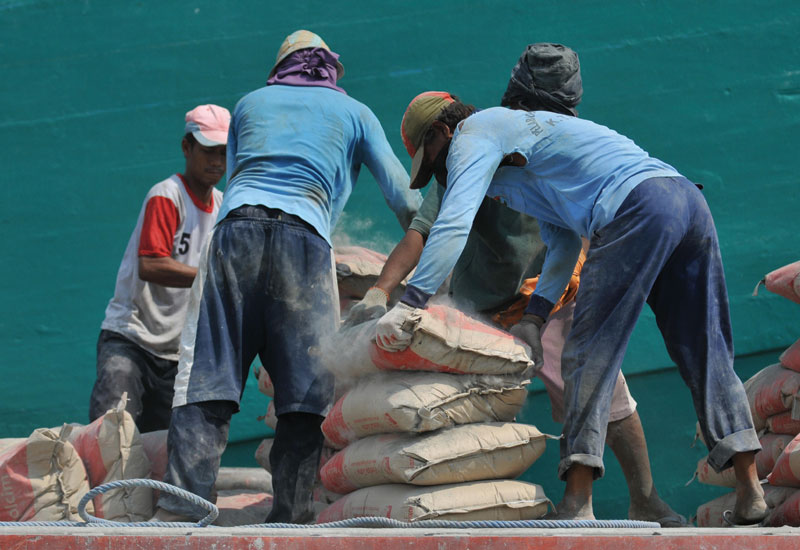Fertiliser prices have risen nearly 30% since the start of 2022, according to World Bank estimates.
“The increase in prices was driven by a combination of factors, including rising input costs, supply disruptions caused by sanctions against (Belarus and Russia), and restrictions on Chinese exports,” a recent bank report said last Wednesday.
Urea prices passed their 2008 peak, phosphate and potash prices are approaching 2008 levels, and concerns about Fertiliser affordability and availability have been exacerbated by the war in Ukraine.
Urea prices more than doubled in 2021, averaging $524 per tonne, compared to $254 per tonne in 2020 due to the rise in natural gas prices in international markets, while prices last April amounted to about $925 per tonne.
Nitrogen Fertiliser prices have been severely affected by the rise in production costs in Europe, and their prices have risen a lot since the beginning of the Russian invasion of Ukraine, raising the standard prices of urea in Egypt by 55% to reach $1,130 per tonne.
International developments have also contributed to an increase in Egyptian factory exports, which made them benefit directly, after imposing sanctions on Russia and Belarus, which represent about 20% of exports globally, which means that the main players in the Egyptian market benefit.
Hermes Research for Securities said that with the rise in energy prices, the shares of the Fertiliser sector are the top beneficiaries, supported by the high prices, and producers in Saudi Arabia and Egypt will achieve the greatest benefit from direct access to European markets, especially with the stabilization of gas prices.
Egyptian companies
Hermes advised to focus on petrochemical stocks, especially the shares of Abu Qir Fertilisers, and Misr for Fertiliser Production (MOPCO).
The developments were reflected in the results of the Fertiliser manufacturers’ business, as the net profit of the shareholders of the Financial and Industrial Company rose to about EGP 304m in 2021, compared to a net profit of EGP 127m, which is the highest net profit achieved since 2016, according to Mubasher Securities’ research.
The company revealed that it achieved an independent net profit of EGP 98m in the first quarter of 2022, which is the results of the independent company’s business, i.e. the Kafr El-Zayat and Assiut factories, which means that the combined net profit of the company for the first quarter of 2022, after including the results of the Suez Fertiliser Company owned by it, has been up to EGP 180m.
Export sales jumped 6 times during 2021 to reach EGP 1.7bn, compared to EGP 285m in 2020, and export sales contributed about 62.5% of the company’s total annual sales revenue in 2021, compared to 20% for export sales as a percentage of the company’s total sales revenue in 2020.
The research added that the company owns factories for the production of phosphate fertilisers in Kafr El-Zayat and Assiut, in addition to the company’s share of 99.86% in the Suez Fertiliser Manufacturing Company.
The research added that the annual design production capacity of the company, including the Kafr El-Zayat, Assiut and Suez Fertiliser factories, is about 1.62 million tonnes per year, after taking into account the new granulated Fertiliser production line in Ain Sokhna, which will start commercial operation as of the second half of 2022.
It pointed out that the company produces sulfuric acid, which is the main product, most of which is used in the manufacture of the rest of the company’s products, such as fine and granulated superphosphate Fertiliser, sawdust sulfate, and then the product of DCP, which is animal feed, in addition to the company’s most important product is granulated superphosphate Fertiliser, which has the largest share in export earnings.
Mubasher pointed out that Egypt has proven reserves of phosphate ore, amounting to 1.3 billion tonnes, and it is expected to increase with the expected boom in mining projects in Egypt. The raw materials that the company needs also include sulfur ore, which it imports from Russia and Ukraine because of its suitability to the degree of purity that the company needs.
It expected that the Russian-Ukrainian war would increase the costs of shipping the company’s imported sulfur crude, and sulfur crude represented between 15 and 20% of the company’s annual production costs.
It suggested that the company could obtain sulfur from other nearby markets or even partially from local companies, and the company also needs ammonia ore to produce ammonia sulfate.
Mubasher Research expected to achieve strong and unprecedented business results for the company during 2022, and that the company would benefit from higher prices, increased operating rates, production and a boom in local agriculture, and exports, especially after the sanctions on Russia and Belarus and the results of the Russian-Ukrainian war, which contributed to an increase in Egyptian exports from Phosphate Fertilisers, especially for South American countries such as Brazil, which receive approximately 70% of the company’s exports.
Mubasher Research for Securities has set the fair value of the company at EGP 32.79 per share.
Russian-Ukrainian war
The Arab African Stock Exchange Research said that Russia is the main player in the energy and fertiliser industries, providing 20% of the global demand for ammonia and 40% of Europe’s natural gas needs, as it is the second largest producer of ammonia and urea.
The research added that the retaliatory measures taken by the parties to the conflict exacerbated the situation, which prompted the Russian government to suspend fertiliser exports, which further widened the supply deficit.
Most European markets are looking for new trading partners other than Russia; hence, the roads are open for Egyptian fertiliser producers to meet their needs of the global market, and most Fertiliser producers in Egypt are benefiting from the current shortfall in supply.
In the local market, the Egyptian government may raise the prices of natural gas supplied to energy-intensive industries against the background of rising international prices. The rise in energy costs will be a clear negative for domestic Fertiliser producers.
The research expected that the decision to raise natural gas prices would be followed by the liberalization of the prices of subsidized domestic nitrogen fertiliser, suggesting that the increase in the prices of natural gas supplies would have a neutral effect on the Egypt Fertiliser Production Company, especially as it receives natural gas in a floating form that has a floor and moves with international urea prices.
Arab African Research expects that Egypt’s profits for fertiliser production will grow by 54% in 2022 due to the rise in urea prices, and the company has achieved a 93% increase on an annual basis to reach EGP 4.8bn during 2021 due to the rise in urea prices in both local and international markets.
MOPCO managed to record a net cash position of EGP 1.9bn in the 2021 fiscal year, compared to a net debt of EGP 2.84bn in the 2020 fiscal year.
The research suggested that the company’s revenues would grow at an annual rate of 5 years (2021-2026) by 6% thanks to the rise in urea prices due to the recent supply crisis in the international market, supported by the rise in urea export prices due to the Russian-Ukrainian war.
The research determined the fair value of the share of MOPCO at EGP 128.6 per share, with a recommendation to increase the relative weights.
Abu Qir Fertilisers came on the list of manufacturers’ beneficiaries due to the repercussions of the Russian-Ukrainian war. The company’s revenues jumped by 55% to reach EGP 6.2bn during the first half of the current fiscal year, which led to a wider gross profit margin of 63%.
Arab African Research for Securities expected that earnings before interest and taxes will grow by 74% on an annual basis to reach EGP 6bn in the fiscal year 2022/21, thanks to the expected growth in revenues by 38% on an annual basis to reach EGP 12.2bn.
Research has suggested that urea export prices will grow at a compound annual growth rate of 6% for a period of 5 years to $383 per tonne by fiscal year 2026/25.
Research recommended buying Abu Qir Fertilisers share, with a fair value of EGP 33.8 per share.




